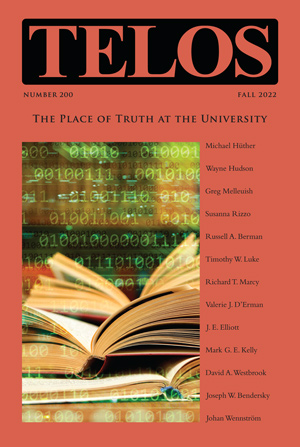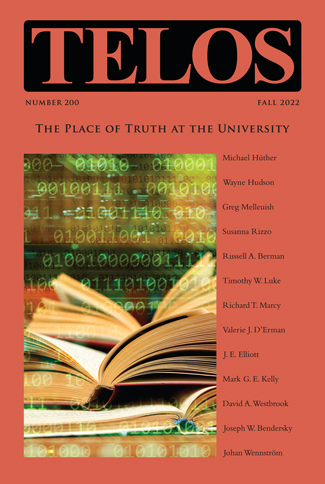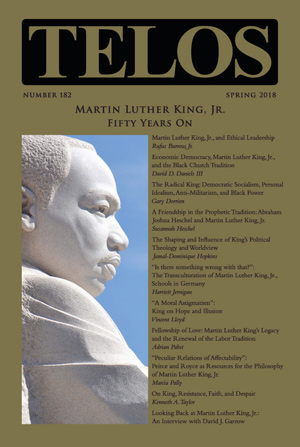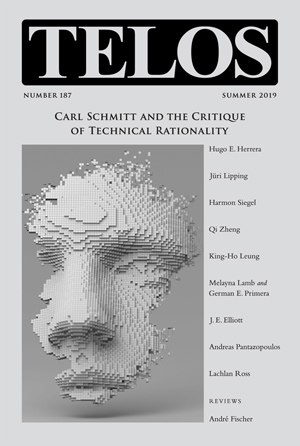By David Pan · Thursday, December 15, 2022  As the teaching assistant strike at the University of California extends into its fifth week, it seems that education has increasingly merged with activism. In fact, J. E. Elliott argues in our podcast interview that the development of the humanities in particular has moved so far in this direction that activism has become the explicit focus and attraction of majoring in the humanities for college students. As he lays out, such activist-oriented education is not a form of resistance but a result of the corporatization of the university, which involves not just links between corporations and universities but also the way in which college education has developed into a mass market commodity. The expansion of higher education, in promoting the admission of larger proportions of the population into college, has diluted the elite character of the college degree, making it into a more purely professional qualification and forcing colleges to devote more effort into justifying the value of their degrees for the job market. Because the ideals of inclusion and of merit are inherently contradictory, integrating more students into college has devalued the degree credential and therefore colleges must design their programs with an eye toward different segments of the higher education market. Consequently, the humanities at U.S. universities have evolved to establish “Brand English” to compete with “Brand STEM” and “Brand Business” by promoting social activism as its main distinguishing characteristic. As the teaching assistant strike at the University of California extends into its fifth week, it seems that education has increasingly merged with activism. In fact, J. E. Elliott argues in our podcast interview that the development of the humanities in particular has moved so far in this direction that activism has become the explicit focus and attraction of majoring in the humanities for college students. As he lays out, such activist-oriented education is not a form of resistance but a result of the corporatization of the university, which involves not just links between corporations and universities but also the way in which college education has developed into a mass market commodity. The expansion of higher education, in promoting the admission of larger proportions of the population into college, has diluted the elite character of the college degree, making it into a more purely professional qualification and forcing colleges to devote more effort into justifying the value of their degrees for the job market. Because the ideals of inclusion and of merit are inherently contradictory, integrating more students into college has devalued the degree credential and therefore colleges must design their programs with an eye toward different segments of the higher education market. Consequently, the humanities at U.S. universities have evolved to establish “Brand English” to compete with “Brand STEM” and “Brand Business” by promoting social activism as its main distinguishing characteristic.
Without the traditional literary and intellectual canons, the focus of humanities education has shifted toward promoting diversity, equity, and inclusion, which have become in many respects code words for identity politics, socialist-inspired redistribution, and college for all as entry into the job market. But because these three policies are partisan positions that have been enshrined as overarching truths (or in Elliott’s terms, “truth-posits”) for higher education, college humanities have to a large extent abandoned genuine debate about the origins and consequences of different ideas in favor of activist promotion of such ideas. The strike itself foregrounds the focus on equity without, however, considering the consequences of such a policy.
Continue reading →
By Telos Press · Wednesday, December 14, 2022 In today’s episode of the Telos Press Podcast, David Pan talks with J. E. Elliott about his article “Brand English and Its Discontents: Situating Truth and Value in the University Today,” from Telos 200 (Fall 2022). An excerpt of the article appears here. In their conversation they discuss how the pressure to commercialize university work has led to the creation of academic brands; how dissent has converged with commercialization at the university; why there is a conflict between meritocracy and inclusion, and how academic branding resolves it; how the peer review process has been undermined by academic branding; what a return to meritocratic values would look like; and why it is more appropriate to speak of truth-posits rather than truth as a goal of university work. If your university has an online subscription to Telos, you can read the full article at the Telos Online website. For non-subscribers, learn how your university can begin a subscription to Telos at our library recommendation page. Print copies of Telos 200 are available for purchase in our online store.
Continue reading →
By David Pan · Tuesday, November 8, 2022 In his response to my post last week on affirmative action, Florindo Volpacchio emphasizes that the goal of affirmative action is “to recognize the social pathology of discrimination and inequality that privileged race and sexual identity to begin with.” It is certainly important to remember this history and its effects on present conditions, and Volpacchio rightly points out past injustices, including slavery and segregation. Yet those injustices are also clearly in the past. There are no longer any legally enforced forms of segregation and discrimination against Blacks, and the United States can be proud of the progress that has been made. But while Volpacchio seeks to judge affirmative action based on its symbolic intent, its practical effects cannot be ignored, especially as they perpetuate the type of discrimination based on race that they are meant to oppose. Since the history of racial injustice involved the categorization and differential treatment of people based on their race, the resistance to this history must reject such differential treatment and affirm the principle of equality before the law. Yet affirmative action re-establishes racial discrimination as a valid policy for college admissions and hiring. Though this policy favors Blacks today, this can only be done at the cost of disfavoring others, to the point where it disfavors Asian Americans in comparison to both Blacks and Whites. As Thomas Sowell has demonstrated through his careful and extensive research, the track record of worldwide attempts to engineer equality through a set of reverse discriminatory practices is in fact dismal, leading consistently to a skewing of benefits to the wealthier members of the groups they are meant to assist as well as to growing identity-based polarization and even civil war.
Continue reading →
By David Pan · Monday, October 3, 2022 Telos 200 (Fall 2022): The Place of Truth at the University is now available for purchase in our store. Individual subscriptions to Telos are also available in both print and online formats.
 The place of truth at the university has always been elsewhere. Scientific conclusions are after all hypotheses, subject to continuing examination and critique in a process that forever defers the arrival at a final truth. In addition to this unbridgeable temporal distance from truth, there is a spatial distance to the extent that the university is subject to a larger purposive context that stands outside of scientific activity itself. A researcher can be objective by being non-prejudicial in collecting facts and weighing arguments but can never be neutral in terms of the goals of the research, which must always be established before the research begins and from outside of the research project itself.[1] Research cannot begin until an interest in some question has been expressed, and such an interest has generally not been up to the researcher to decide. Whether the goal of medical research will be to protect humans from a virus or attack humans with a virus will be determined by the sponsor of the research rather than the researcher, who at best may decline to take part in some forms of research. If the determiners of the goals of the university are not the professors themselves but the society that sponsors their work, it is within this external values framework that the truth of the university must be found. The place of truth at the university has always been elsewhere. Scientific conclusions are after all hypotheses, subject to continuing examination and critique in a process that forever defers the arrival at a final truth. In addition to this unbridgeable temporal distance from truth, there is a spatial distance to the extent that the university is subject to a larger purposive context that stands outside of scientific activity itself. A researcher can be objective by being non-prejudicial in collecting facts and weighing arguments but can never be neutral in terms of the goals of the research, which must always be established before the research begins and from outside of the research project itself.[1] Research cannot begin until an interest in some question has been expressed, and such an interest has generally not been up to the researcher to decide. Whether the goal of medical research will be to protect humans from a virus or attack humans with a virus will be determined by the sponsor of the research rather than the researcher, who at best may decline to take part in some forms of research. If the determiners of the goals of the university are not the professors themselves but the society that sponsors their work, it is within this external values framework that the truth of the university must be found.
Continue reading →
By Telos Press · Monday, January 18, 2021 Save 30% on Telos 182 (Spring 2018): Martin Luther King, Jr.: Fifty Years On, a special issue dedicated to King’s life and thought, in our store. Offer expires 1/24/21.
 In commemoration of the life and legacy of Martin Luther King, Jr., today’s episode of the Telos Press Podcast features a wide-ranging interview with Kenneth D. Johnson by Telos editor David Pan. Their discussion covers a variety of topics, including the influence of King on the Black Lives Matter movement, the different approaches to political activism and civil disobedience, the call to defund the police, the nature and effects of systemic racism, the role of education in expanding opportunities for the Black community, the role of government in addressing social and economic inequalities, and the question of how a universal basic income might help alleviate these problems. In commemoration of the life and legacy of Martin Luther King, Jr., today’s episode of the Telos Press Podcast features a wide-ranging interview with Kenneth D. Johnson by Telos editor David Pan. Their discussion covers a variety of topics, including the influence of King on the Black Lives Matter movement, the different approaches to political activism and civil disobedience, the call to defund the police, the nature and effects of systemic racism, the role of education in expanding opportunities for the Black community, the role of government in addressing social and economic inequalities, and the question of how a universal basic income might help alleviate these problems.
In addition to being a member of Telos‘s editorial board, Ken Johnson edited Telos 182 (Spring 2018): Martin Luther King, Jr.: Fifty Years On, a special issue dedicated to King’s life and thought. We are now offering a 30% discount on Telos 182 when you purchase your copy in our store. With ten in-depth articles on King’s intellectual and political legacy, as well as an interview with King scholar David Garrow, Telos 182 is a must-read for anyone interested in understanding how Martin Luther King Jr. continues to influence us today. Read the introduction to Telos 182 here.
Listen to the podcast here.
Continue reading →
By J. E. Elliott · Thursday, August 1, 2019 J. E. Elliott’s “Insourcing Dissent: Brand English in the Entrepreneurial University” appears in Telos 187 (Summer 2019). Read the full article at the Telos Online website, or purchase a print copy of the issue in our online store. Individual subscriptions to Telos are available in both print and online formats.
 This essay addresses the emergence of dissent culture as a hallmark of teaching and research in English studies and the humanities more generally in the time and temper of the commercial-bureaucratic university. I argue that the most convincing explanation for the widespread adoption of a protest ethos in an institution ostensibly opposed to its prescriptions is not a paradigm shift from formalist to political approaches to texts and artifacts, much less principled opposition to late Western capitalism or technological reason, but a reproduction of the routines, scripts, norms, and values of American higher education as an entrepreneurial enterprise. Dissent, in other words, is an organizationally conservative force: it animates disciplinary alternatives to STEM and business curricula while articulating a remedial narrative of inclusiveness (“diversity”) that bears witness to American higher education’s residual commitments to political engagement and democracy building. This insourcing of protest has assured English studies’ viability in the corporate university by reconfiguring the discipline as an academic brand alongside Brand Science and Brand Business in the organizational field of the university. To the extent that the politics of advocating for the disempowered and marginalized is an in-house creation without demonstrable political or policy-related impact, however, dissent culture can also be read as a reflexive (and symptomatic) protest against its own institutional capture. The essay concludes with a discussion of prospective alterations to Brand English in light of recent developments in the digital humanities. This essay addresses the emergence of dissent culture as a hallmark of teaching and research in English studies and the humanities more generally in the time and temper of the commercial-bureaucratic university. I argue that the most convincing explanation for the widespread adoption of a protest ethos in an institution ostensibly opposed to its prescriptions is not a paradigm shift from formalist to political approaches to texts and artifacts, much less principled opposition to late Western capitalism or technological reason, but a reproduction of the routines, scripts, norms, and values of American higher education as an entrepreneurial enterprise. Dissent, in other words, is an organizationally conservative force: it animates disciplinary alternatives to STEM and business curricula while articulating a remedial narrative of inclusiveness (“diversity”) that bears witness to American higher education’s residual commitments to political engagement and democracy building. This insourcing of protest has assured English studies’ viability in the corporate university by reconfiguring the discipline as an academic brand alongside Brand Science and Brand Business in the organizational field of the university. To the extent that the politics of advocating for the disempowered and marginalized is an in-house creation without demonstrable political or policy-related impact, however, dissent culture can also be read as a reflexive (and symptomatic) protest against its own institutional capture. The essay concludes with a discussion of prospective alterations to Brand English in light of recent developments in the digital humanities.
Continue reading →
|
|
 As the teaching assistant strike at the University of California extends into its fifth week, it seems that education has increasingly merged with activism. In fact, J. E. Elliott argues in our podcast interview that the development of the humanities in particular has moved so far in this direction that activism has become the explicit focus and attraction of majoring in the humanities for college students. As he lays out, such activist-oriented education is not a form of resistance but a result of the corporatization of the university, which involves not just links between corporations and universities but also the way in which college education has developed into a mass market commodity. The expansion of higher education, in promoting the admission of larger proportions of the population into college, has diluted the elite character of the college degree, making it into a more purely professional qualification and forcing colleges to devote more effort into justifying the value of their degrees for the job market. Because the ideals of inclusion and of merit are inherently contradictory, integrating more students into college has devalued the degree credential and therefore colleges must design their programs with an eye toward different segments of the higher education market. Consequently, the humanities at U.S. universities have evolved to establish “Brand English” to compete with “Brand STEM” and “Brand Business” by promoting social activism as its main distinguishing characteristic.
As the teaching assistant strike at the University of California extends into its fifth week, it seems that education has increasingly merged with activism. In fact, J. E. Elliott argues in our podcast interview that the development of the humanities in particular has moved so far in this direction that activism has become the explicit focus and attraction of majoring in the humanities for college students. As he lays out, such activist-oriented education is not a form of resistance but a result of the corporatization of the university, which involves not just links between corporations and universities but also the way in which college education has developed into a mass market commodity. The expansion of higher education, in promoting the admission of larger proportions of the population into college, has diluted the elite character of the college degree, making it into a more purely professional qualification and forcing colleges to devote more effort into justifying the value of their degrees for the job market. Because the ideals of inclusion and of merit are inherently contradictory, integrating more students into college has devalued the degree credential and therefore colleges must design their programs with an eye toward different segments of the higher education market. Consequently, the humanities at U.S. universities have evolved to establish “Brand English” to compete with “Brand STEM” and “Brand Business” by promoting social activism as its main distinguishing characteristic. 




